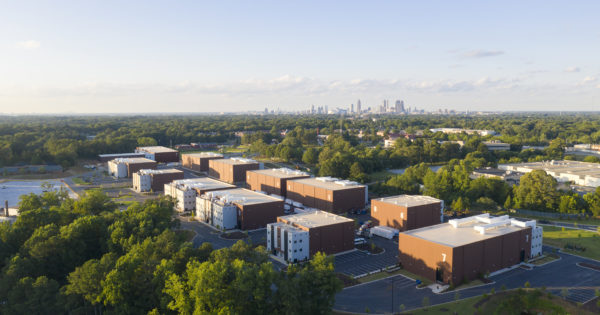American actor, director, writer and producer Tyler Perry became best known for creating the immensely popular Madea character, a no-nonsense elderly African-American woman, who was played by Perry in a string of widely successful films from 2005 to 2022.

Born and raised in New Orleans, Louisiana, Perry grew up in an abusive household. His father would often beat him, which sunk Perry into a deep depression as a teenager. In later years, Perry would also reveal that he was sexually abused at the age of 10 by a friend’s mother, a deeply traumatic event that only added to his depression.
Perry never finished high school but did earn his GED, and in 1990, when he was 20 years-old, he fled New Orleans and moved to Atlanta. It was in Atlanta, while scraping by working in an office, that Perry just happened to catch an episode of “The Oprah Winfrey Show” (Syndicated, 1986-2011). Oprah was interviewing a guest who spoke about the healing powers of writing to overcome traumatic events in one’s life. Intrigued, Perry picked up a pen and began writing a series of letters to himself which would go on to become his first musical play “I Know I’ve Been Changed.” Perry eventually saved $12,000 to put the play on at a community theater in Atlanta in 1992. The show flopped, however, with Perry failing to recoup his investment.

Determined to share his play with a wider audience, Perry spent the next 6 years endlessly rewriting the play until he got it absolutely right. Finally satisfied with the version he came up with, Perry put on the retooled version of “I Know I’ve Been Changed” at the House of Blues in Atlanta. This time, the play was a hit, and over the next several years Perry gained a devoted following in the African-American community for writing and appearing in a series of popular plays he toured the country with. With the money he earned from touring, Perry decided to write, produce and star in his very first film, 2005’s “Diary of a Mad Black Woman.” That film, which was made for $5.5 million, introduced the Madea character to the world, and was a hit at the box office, making over $50 million. More Madea films followed, including “Madea’s Family Reunion” (2006), “Madea’s Witness Protection” (2012), “A Madea Family Funeral” (2019). Perry retired the character in 2019, saying “A Madea Family Reunion” would be the last of his films the character would appear in.

Throughout his time focusing on the Madea film franchise, the inexhaustible Perry made a name for himself outside the character by acting in numerous films, writing and directing his own projects, and producing various films and TV shows. As an actor, Perry wowed audiences for his impressive work in films like “Alex Cross” (2012), “Gone Girl” (2014), and “Vice” (2018). He also was the producer behind several successful television shows, including “House of Payne” (TBS, 2007-2012), “The Haves and Have Nots” (OWN, 2013- ), and “The Paynes” (OWN/BET, 2018- ).
In 2012, Perry‘s entertainment career came full circle when he signed a partnership deal with the Oprah Winfrey Network to produce scripted shows to OWN. In his partnership with OWN, Perry has produced a number of successful shows like “The Haves and Have Not” and “The Paynes“. In 2019 Perry began producing shows for Viacom, including “The Oval” (BET, 2019- ) and “Sistas” (BET, 2019- ). Both shows premiered in the fall of 2019 on BET.

Tyler Perry Studios
In 2006 Perry began to expand his work beyond Madea with the creation of the television comedy series House of Payne. The TBS television network began distributing the show in 2007. Although Madea is a recurring character on the program, she is not the central focus. That same year his feature films Daddy’s Little Girls and Why Did I Get Married opened, followed in 2008 by Meet the Browns and The Family That Preys.
Tyler Perry Studios, the first film studio in the country to be solely owned by an African American, opened in October 2008. The 200,000-square-foot facility, originally located in the old Delta Air Lines headquarters in Atlanta, featured a soundstage named for Georgia native Ossie Davis and his wife, Ruby Dee. Perry’s streamlined method of filmmaking offered a striking contrast to that of most mainstream Hollywood films: his productions were generally completed much more quickly and with a lower budget, but generated significantly higher returns. Both Essence and Time magazines named him one of the most influential people of 2008.

In 2009 Perry debuted his second television series, “Meet the Browns“, on TBS and released the film adaptation of “I Can Do Bad All by Myself”. That same year he played the role of Admiral Richard Barnett in the feature film Star Trek and served as an executive producer for the film Precious: Based on the Novel “Push“ by Sapphire. The critically acclaimed Precious marked a new direction for Perry, and in 2010 he announced the formation of 34th Street Films, an art-house division of Tyler Perry Studios. The first project for the new venture was Perry’s film adaptation of playwright Ntozake Shange’s “For Colored Girls Who Have Considered Suicide When the Rainbow Is Enuf“, which ran on Broadway from 1976 to 1978.
In addition to his work as an actor, producer, writer, and director, Perry expanded his business and philanthropic ventures. In 2015 he purchased most of Fort McPherson, a former U.S. Army base established in 1885 and named after Union General James B. McPherson. The base had been closed since 2011, and Perry believed moving his studio to the area would revitalize the surrounding neighborhoods of Atlanta. While some nearby residents objected to exchanging one walled institution for another, Perry successfully purchased 330 of the base’s 488 acres for $30 million. Critics cried foul, alleging a sweetheart deal, and questioned whether or not Perry had paid fair market value for the property.

In 2018 the new location opened, featuring twelve large soundstages, as well as several standing sets that included a replica of the White House. Perry retained other parts of Fort McPherson for additional sets, preserving the fort’s baseball field and post theater. That same year, Perry sold off the previous location to his one-time studio president Ozzie Areu.
The COVID-19 pandemic threatened Tyler Perry Studios with a lengthy shutdown, but Perry determined to utilize his studio’s on-site residences (including several livable barracks from Fort McPherson) to isolate and test workers on set. With this and other safety precautions in place, Tyler Perry Studios was again shooting within months. Perry also donated to those affected by the economic downturn caused by the pandemic. In recognition of his charitable efforts, Perry received the Jean Hersholt Humanitarian Award at the 2021 Academy Awards Ceremony. Later that year, Perry purchased additional land from the former Fort McPherson, bringing his ownership to 368 acres.
Perhaps not as famous as America’s greatest playwrights, Tyler Perry has become has become known as the man who revitalized urban theatre and gave new meaning to gospel theatre.
CREDIT: www.rottentomatoes.com










